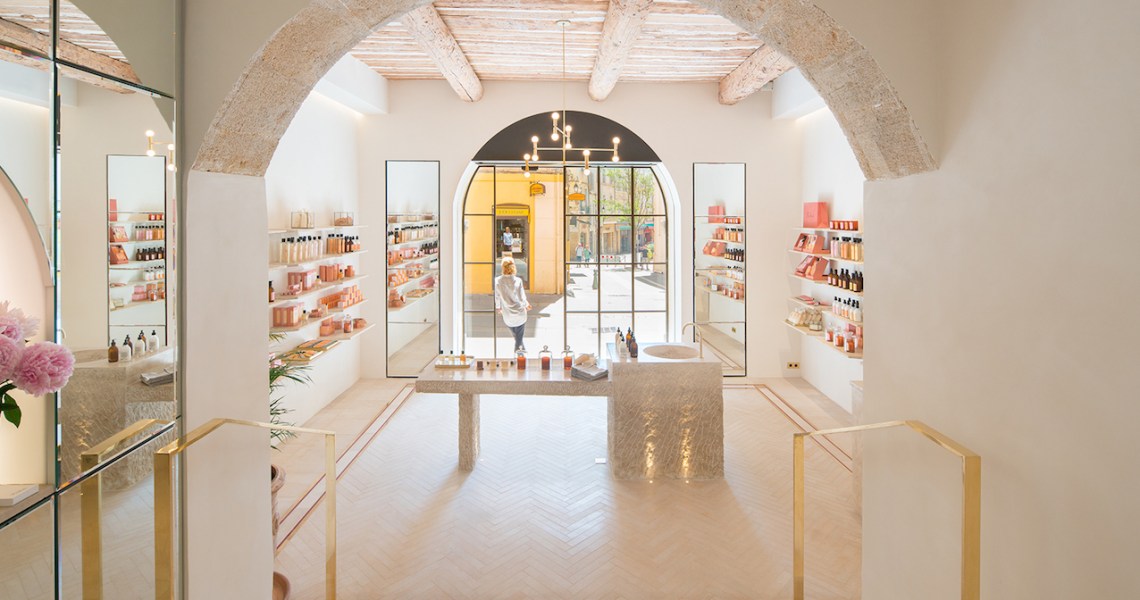Beauty brands and retailers are navigating how heightened levels of hygiene could work in tandem with the traditional “human touch” at the counter. While social distancing mandates mean digital solutions like AR-powered mirrors continue to be top-of-mind, industry advisors are looking at ways to retain the familiar in-store experience, and ensure shoppers can still try-out formulas on their skin through sampling innovations and guided self-application consultations.
Elevated health protocols, like increased sanitization efforts, required masks and the removal of product testers, are being prioritized as part of the beauty counter’s reopening process. In response, design and build firm RPG, which works with E.l.f Cosmetics, Burt’s Bees, Benefit Cosmetics and Bloomingdale’s, is advising clients to take advantage of single-dose sample dispensing systems. These can help to maintain crucial human interaction, plus offer tactility and an experience “from a point of view that is confident and safe,” said Bruce E. Teitelbaum, CEO of RPG.
“The big question in beauty service and beauty operating is: How will people engage with products?” said Teitelbaum. “There are certainly going to be [new] aspects of the digital experience in-store … but the problem in prestige beauty is that nothing really takes the place of a consumer trying on a shade or trying on a color on her skin.”
Online, the beauty industry has recently seen an uptick in brands using sampling models to drive e-commerce sales, whether it’s through a loyalty program like Sephora’s or through a private community like Glow Recipe with its new digital sampling program. But retailers and brands should also consider the added benefit of in-person engagement, said Kim-Van Dang, co-founder of luxury fragrance distribution company KVDAR Inc. and owner of fragrance concept store Havens.
“The idea is that your salesperson is talking to the customer while they’re handing them the blotter and sharing information about the product, so it’s all about romancing,” she said.
Ellen Friedman, executive vice president of RPG, said retailers will likely need to “staff up” with highly educated beauty advisors to help shoppers navigate newer contactless systems like mobile checkout.
“It’s going to be like the Apple Store; you’re not going to want lines or to have customers wandering around, so you’re going to need more help,” Friedman said. “Retailers are going to want to make the shopping experience easier, because people aren’t going to want to spend as much time in the store.”
Ad position: web_incontent_pos1
Virtual methods of customer engagement that have taken place during lockdown are likely to continue long after stores reopen. Blushington’s makeup artists, for example, have been offering online makeup classes through the company’s website, and CEO Natasha Cornstein said she expects that these classes “will become equally as important, if not eclipse the volume of [customer traffic at] our brick-and-mortar stores.”
Retailers and brands could be looking at a scenario where these virtual experiences complement or enhance the traditional in-store makeover or the product testing process with estheticians, said Dani Coplen, evp and executive creative director of The Integer Group, which currently works with clients like Coty and Sally Hansen.
“The interaction will be there, it will just be a no-touch interaction,” said Coplen. “So we’re talking about things like guided self-application, where a makeup artist is still there and present, whether that’s in-person or through a video tutorial or a chat room interaction. They can still guide self-application and give you the tricks of the trade, but you’ll likely be doing it yourself.”
Coplen said Integer is encouraging its clients to think about how technology can also be harnessed to personalize product sampling and lower the online purchasing barrier for customers. Stores should consider implementing data-gathering tools to determine shopper’s personal shade, color and cosmetic formula preferences when they try out products. “Much more targeted sampling” may also help drive down the rising costs for sample production, said Dang.
But expanding expensive sampling might not be realistic, especially for companies that are seeing steep sales declines.
Ad position: web_incontent_pos2
Teitelbaum said costs for alternative sampling systems could be offset by retailers not using testers and “spending wisely in other areas.”
And, Friedman said, they’re necessary. “[Testing] makes beauty retail relevant.” she said. “It’s super crucial right now, in terms of getting people back into the store.”




